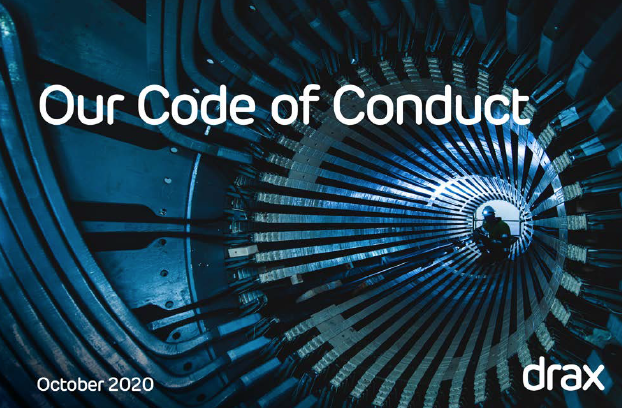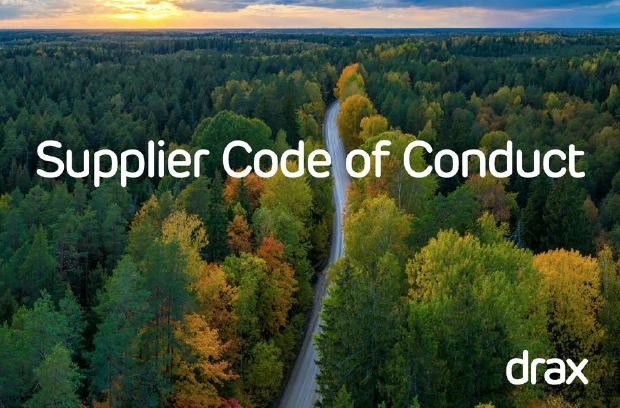Introduction
“We believe in doing the right thing”
In this, our fifth Modern Slavery Statement, we outline the progress we’ve made in 2020 and our planned improvements for 2021.
We’re making this Statement for the financial year ending December 2020 and according to the requirements of section 54, part 6, of the Modern Slavery Act 2015.
Due to the Government’s ongoing review of slavery reporting rules, we may need to extend our reporting period to 31 March 2021.
This Statement applies to all companies within the Drax Group (“Drax”) that are required to publish a Statement, as listed in the ‘statement approval’ section.
For further information on Drax and our earlier Modern Slavery Statements, please see our websites:
Organisational structure
Our integrated flexible and renewable value chain
Pellet production
Our pellets provide a sustainable, low-carbon fuel source that can be safely and efficiently delivered through our global supply chian and used by Drax’s Generation business to make flexible, renewable electricity for the UK.
Based in North America this business aims to increase capacity from 1.5Mt to 5Mt and reduce production costs by 2027 to support a long-term future for sustainable biomass.

Generation
Our multi-site, multi-technology portfolio of flexible, low-carbon and renewable UK power assets provides power and system support services to the electricity grid.
This portfolio provides long-term earnings stability and opportunities to optimise returns from the transition to a low-carbon economy.
Drax is the UK largest single source of renewable electricity and is developing an option for carbon negative electricity using bioenergy carbon capture and storage (BECCS).
The Group also has options for system support gas assets and a long-term option for the potential of pump storage.

Customers
Our Customers business is principally focused on renewable electricity sales to industrial and corporate customers. The business also offers non-generation system support and energy management services in addition to providing a route to market for many smaller embedded renewable generators.

Drax operates an integrated value chain across three core areas of activity in the US and the UK:
- Biomass production
- Power generation and system support services
- Business to Business (B2B) energy supply and management solutions
Safety, sustainability and operational excellence underpin all our activities.
Our UK and US biomass production assets include:
Daldowie Fuel Plant, UK
Daldowie Fuel Plant processes sludge from a wastewater treatment plant and converts it into dry, low-odour fuel pellets. Daldowie can convert 1,000 tonnes of sludge into 23.5 tonnes of biomass pellets for use as a sustainable fuel source. This safely disposes large volumes of sludge that might otherwise end up in landfill.
Drax Biomass, US
Drax Biomass International manufactures compressed wood pellets produced from sustainably managed working forests (in Louisiana, Mississippi and Arkansas) that supply fuel to Drax Power Station.
Headquartered in Monroe, Louisiana, the company owns and operates three wood pellet manufacturing plants: Amite BioEnergy in Gloster, Mississippi; Morehouse BioEnergy near Bastrop, Louisiana; and LaSalle BioEnergy, near Urania, Louisiana. A port facility in Baton Rouge, Louisiana manages the shipping of the compressed wood pellets.
Our UK power generation assets include:
Drax Power Station
Drax Power Station is the biggest renewable generator in the UK. It supplies 11% of the UK’s renewable power and generates enough power to keep the lights on in more than 6 million homes.
Cruachan Power Station
Cruachan Power Station is one of only four pumped hydro storage stations in the UK and has a capacity of 440 MW – enough to power more than 90,000 homes.
Hydro-electric power stations
Lanark consists of two hydropower stations – at Bonnington and at Stonebyres – and has a total capacity of 17 MW. Galloway comprises six power stations (Drumjohn, Kendoon, Carsfad, Earlstoun, Glenlee and Tongland), eight dams and a series of tunnels, aqueducts and pipelines that help to control the flow of the water – and has a total capacity of 109 MW.
Our UK energy supply businesses include:
Haven Power
Haven Power supplies and manages electricity for large industrial and commercial customers, as well as smaller businesses. Haven Power supplies renewable electricity as standard, and at no extra cost to customers.
Opus Energy
Opus Energy supplies electricity and gas to businesses and has partnerships with over 2,000 independent UK renewable energy generators. This provides a market for power from renewable energy sources such as wind, solar, hydro and anaerobic digestion.
Our anti-modern slavery programme
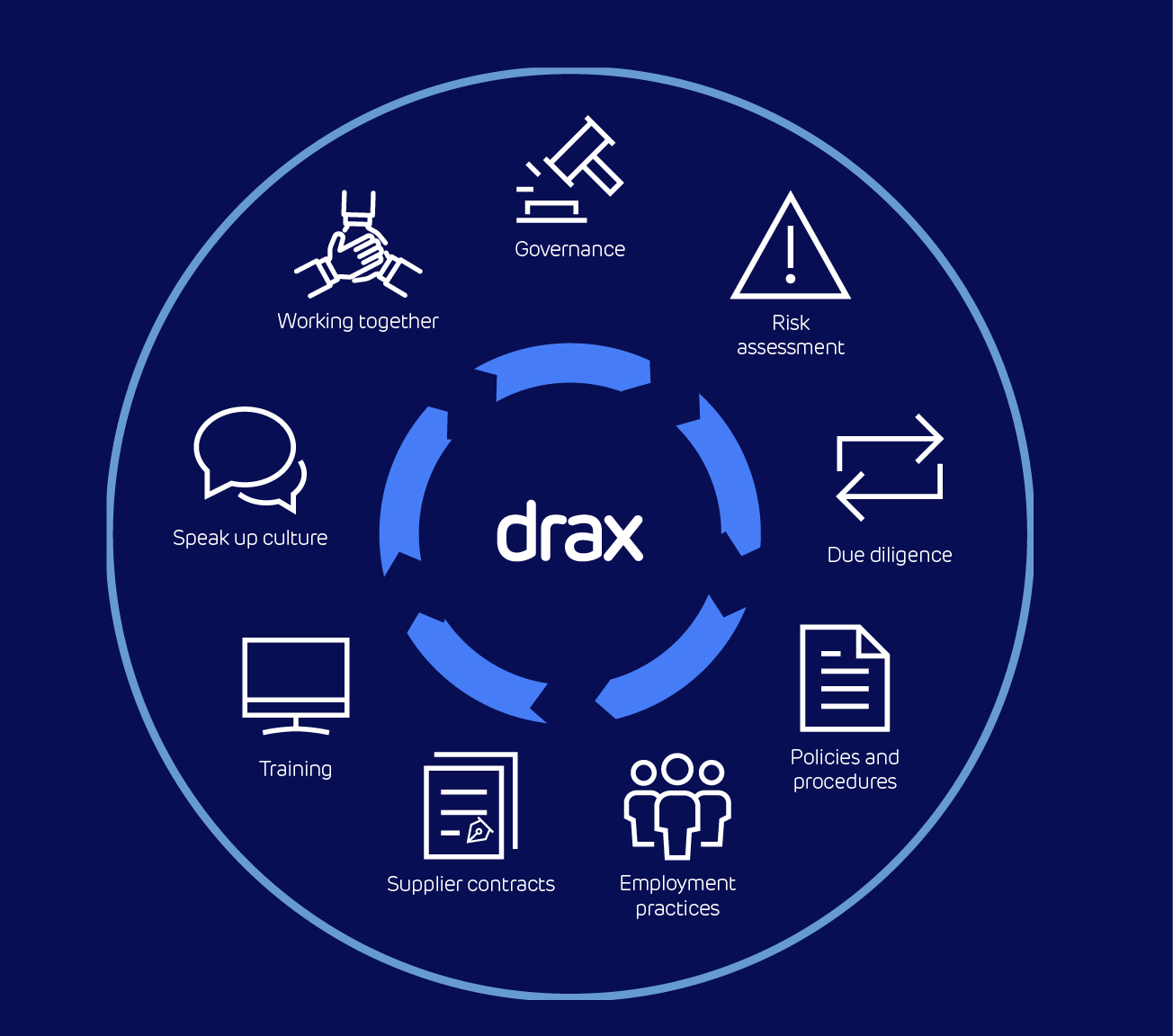
Governance
Our Modern Slavery Working Group (MSWG) is responsible for the development and delivery of our anti-modern slavery programme and provides a quarterly report on its activity to our Ethics and Business Conduct Committee (EBCC).
Our EBCC, a sub-committee of our Executive Committee, oversees our programme. It provides an annual report on its decisions and activity to our Audit Committee, which comprises executive and non-executive directors.
The EBCC:
- Has approved a protocol and remediation plan, based on guidance from the Home Office, that we must follow if we discover modern slavery in our business or supply chain
- Is responsible for making sure Drax takes appropriate steps to investigate and remediate the risk of modern slavery, both within our own business and our supply chain
No cases of modern slavery have been escalated to the EBCC to date. We continue to work with our colleagues and suppliers to raise awareness and promote transparency in our supply chains.
Progress in 2020:
- The EBCC, in addition to the Executive Committee and Board, approved a new Drax Code of Conduct (‘Drax Code’) and Supplier Code of Conduct (‘Supplier Code’)
- The MSWG continued its work to deliver Drax’s ongoing improvement programme, as reported throughout this statement
- The EBCC approved a detailed remediation plan (to be used should modern slavery be discovered in Drax’s supply chain)
- Drax’s Employee Forums were engaged to establish the effectiveness of Drax’s anti-modern slavery programme
“The MSWG continued its work to deliver Drax’s ongoing improvement programme, as reported throughout this statement”
In 2021, we plan to:
- Increase the frequency of our communication on the topic of modern slavery, following feedback from our Employee Forums
- Research suitable ‘in-country’ Non- Governmental Organisations (NGOs) and/ or other partners to support Drax should an issue occur that requires the EBCC approved remediation plan to be put into action
Risk Assessment
We’re committed to identifying and addressing modern slavery that could be connected to both our business and supply chain.
Due to the controls and practices we’ve adopted (as described in the ‘Employment Practices’ section below), we believe the risk of modern slavery in our own business is very low.
Our wider supply chain is varied and complex, meaning the risk of modern slavery is higher. We have almost 4,000 suppliers across our procurement activities and engage with many different industries, including forestry, manufacturing, freight and logistics, engineering, construction, IT, and site services.
The Global Slavery Index, which is incorporated into our due diligence platform, continues to contribute to the risk assessment of potential suppliers. If the assessment returns a medium or higher risk result, then we issue a supplementary questionnaire for completion. This includes questions on underage workers, employee rights and freedoms, use of foreign and migrant workers, due diligence processes, policies, and procedures.
In 2020, we started collaborating with supply chain sustainability experts ELEVATE. Our work leverages ELEVATE’s supply chain intelligence platform and datasets, and geographic, commodity and biomass research. Identifying local industry risk trends in this way helps to inform our risk mitigation activities.
Supply chain mapping
The following graphic provides statistics on our 2020 fuel supply procurement activity. Of those countries listed, we consider Latvia, Estonia, Lithuania, Russia, Ukraine, and Belarus (sub tier 1) to be higher risk for modern slavery. We carry out additional due diligence on these supply chains as described above.
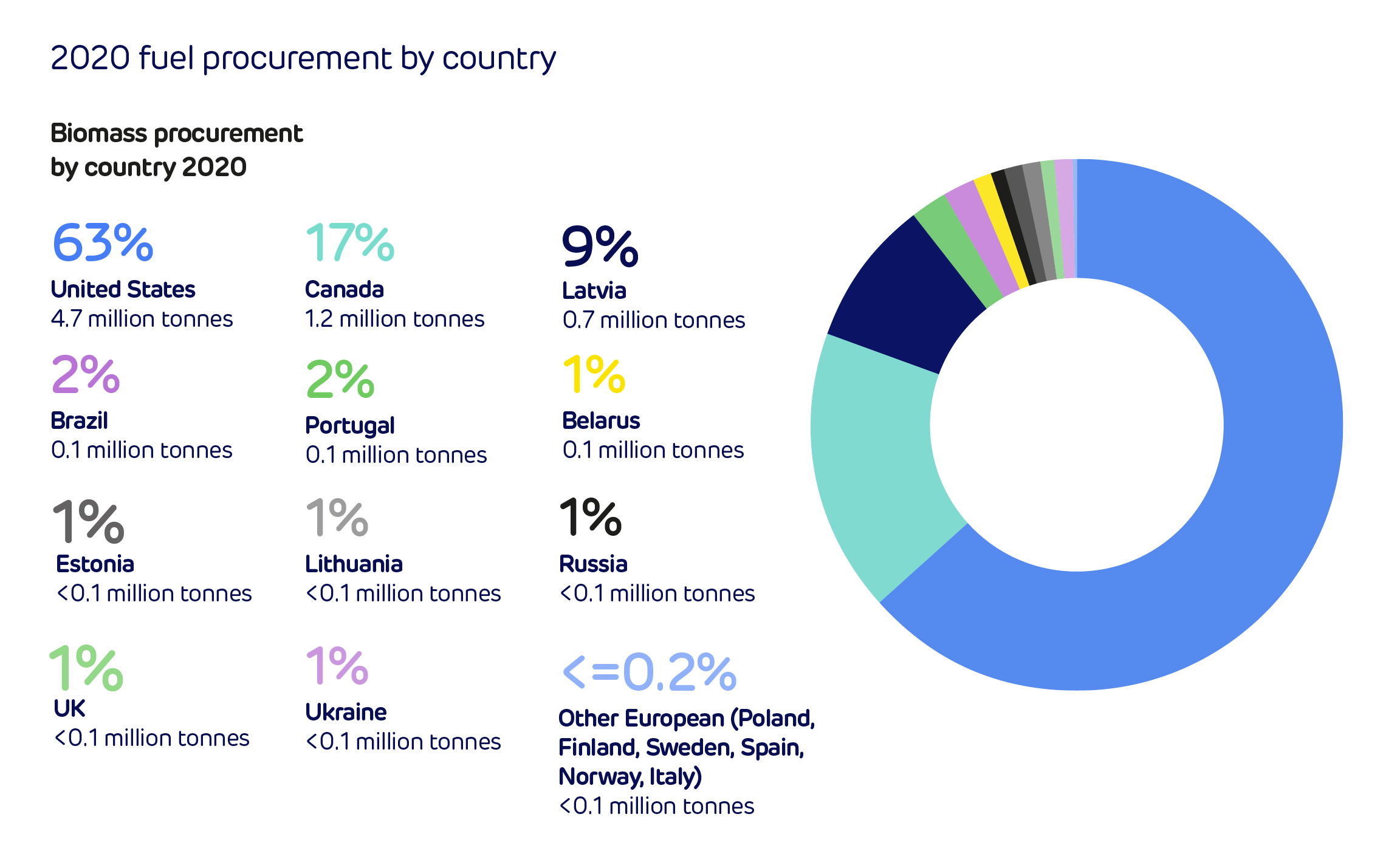
Coal procurement
Drax will end commercial coal generation at Drax Power Station by March 2021. To this end, we didn’t receive any international coal in 2020 and had only two deliveries of domestic coal (Scotland) totaling <3kt.
Non-fuel supply:
The following graphic provides statistics on our 2020 non-fuel procurement activity, by percentage of spend and geography, on our tier 1 supply. It shows that 92% of our spend is with tier 1 suppliers based in the UK.
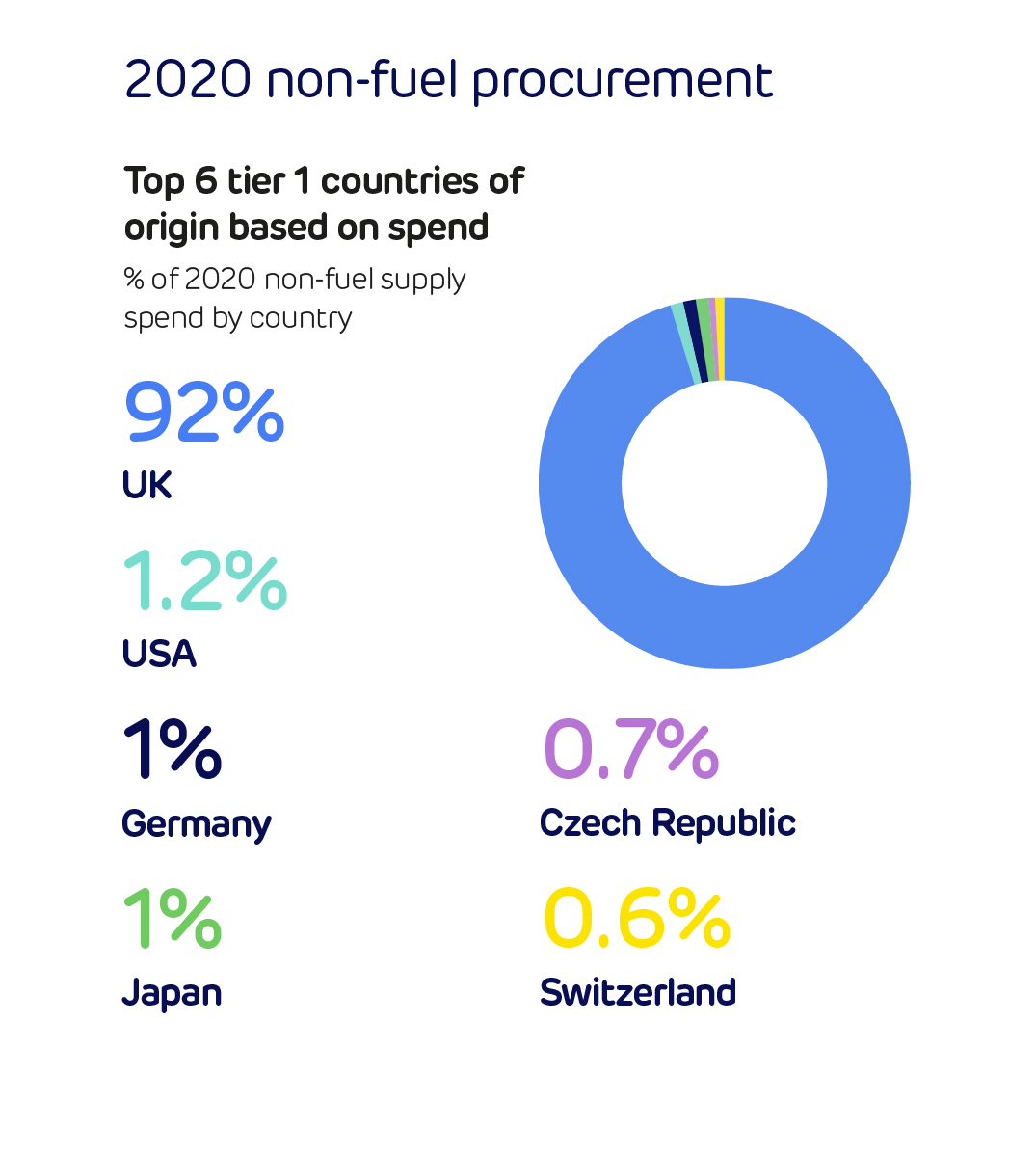
In 2020, our Procurement team, as part of our supplier category management processes, continued a project to map our non-fuel supply chain. The team carried out an initial trial on our ‘metering’ category (for our second generation of smart meters), using the ELEVATE platform to support the risk assessment process. We’ll continue this work across our top categories of non-fuel spend in 2021.
In the meantime, our policy is to carry out risk-based due diligence on all suppliers before entering a contract. We also endeavour to include obligations within these agreements for suppliers to cascade our standards to sub-contractors. We’ve started to introduce our new Supplier Code into our onboarding and contracting processes.
Progress in 2020:
- Completed an annual risk assessment, in line with Home Office guidance, and reported it to the EBCC
- Updated the Group-wide modern slavery risk register. Like the risk assessment, the register was subject to the EBCC’s review
- Issued the modern slavery questionnaire to appropriate third parties and assessed responses, following up as required
- Progressed work to map the supply chain of our top categories of non-fuel spend
- Enhanced our risk assessment toolkit by purchasing and implementing a new third party system, ELEVATE
- Researched additional tools that could further strengthen our risk assessment processes
- Started to introduce our new Supplier Code into onboarding and contracting processes
In 2021, we plan to:
- Continue to introduce our new Supplier Code into onboarding and contracting processes for new agreements, or at the point of renewal for existing agreements
- Continue work to map the supply chain of our top categories of non-fuel spend
- Further strengthen our country risk assessment process by engaging a third-party expert
- Implement additional tools to strengthen the risk assessment process, as the EBCC deems appropriate
Due Diligence
We’re committed to conducting business with honesty and integrity, and in accordance with applicable laws and regulations.
Country and supplier approval
Our due diligence system automatically calculates the geographic risk of potential suppliers, based on several system-hosted indices. In relation to modern slavery, these include the Global Slavery Index.
The EBCC must approve higher risk countries before business can be conducted there. The EBCC can consider blanket country approvals, or specific contract approvals, depending on the consolidated commercial interest in that country. The EBCC will also consider the level of risk identified with that commercial interest and/or the associated supply chain.
Due diligence checks are carried out on suppliers and, where appropriate, their associated persons and supply chain. Should we identify concerns during the process, we may procure enhanced due diligence from a specialist service provider before escalation to the EBCC. The EBCC (or Executive Committee) will decide whether to appoint the supplier.
We’ve established a due diligence platform which all our business units use, both in the UK and the US. We use the platform to perform initial due diligence and continually monitor suppliers. Designated colleagues across our business units review the monitoring alerts (in conjunction with a standard company-wide process) and, if appropriate, escalate to the Group Business Ethics team.
Modern slavery instances
In 2020, our due diligence processes identified no instances of modern slavery.
Progress in 2020:
- Evaluated the appropriateness of our due diligence approach for trial volumes of potential new fuels, including benchmarking with another UN Global Compact Modern Slavery Working Group member
- Carried out an end-to-end review of Drax Group’s due diligence processes and presented the findings to the EBCC (‘2020 Due Diligence Review’)
- Reviewed the Modern Slavery statements of our key freight partners to establish where collaboration might have the most value
- Continued to operate our due diligence processes throughout the pandemic to make sure we could investigate any concerns emerging because of COVID-19
In 2021, we plan to:
- Further strengthen the human rights content of our biomass supplier audits
- Explore additional tools/systems that may enhance Drax’s due diligence toolkit regarding human rights
- Implement the recommendations identified as part of the 2020 Due Diligence Review
- Seek to collaborate with select freight partners on their due diligence programmes and modern slavery initiatives
Policies and Procedures
We expect colleagues to work with our values in mind and to follow our documentation framework, which includes our codes, policies and procedures.
In 2020, we developed two Codes of Conduct. The Board approved the Drax Code in September and it was deployed as a mandatory read to all colleagues and non-permanent workers (c. 3,100 people) in October. The Board approved the Supplier Code in October and a working group will facilitate its implementation. We provide online access to both documents here.
Drax Code
Supplier Code
The Drax Code is supplemented by policies, procedures, and guidance that provide further information on the obligations applicable to Drax and how we ensure compliance with them. All our written materials are readily available to colleagues via our Group intranet.
Should a colleague fail to meet the standards expected by the business, Drax commits to fully investigate the matter in line with the relevant terms of employment and disciplinary procedures.
Progress in 2020:
- Continued a Group Policy Project to make sure our mandatory policies are up to date and published on a single platform
- Separated the content of our Corporate Crime policy into its constituent parts, creating a specific policy on Human Rights
- Reviewed our Due Diligence Guide as part of the 2020 Due Diligence Review
In 2021, we plan to:
- Continue with the implementation of our Supplier Code for new agreements, or at the point of renewal for existing agreements
- Develop refresher eLearning content on our Drax Code
These mandatory, principles-based documents form part of our Documentation Framework. They set out the values and behaviours we expect from our people and from those we conduct business with.
Employment Practices
We do not tolerate any form of human trafficking, forced or bonded labour or the exploitation of children or vulnerable persons in our own business or our supply chains. We’re committed to tackling this abhorrent crime.
We strive to be an inclusive workplace and value diversity, with policies and practices in place to encourage this. We currently employ over 3,000 people across the UK and the US.
Our HR strategy centers around valuing people and focusing on talent, raising business performance, building capability through our people, and developing a high performing organisation. Our colleagues are at the heart of our success and are key enablers of our business strategy and our ethical culture.
It’s paramount that we have a safe and healthy work environment for all our colleagues. That’s why we provide different kinds of support and have a range of relevant policies in place. These include policies designed to enable wellbeing and to accommodate different work and lifestyle preferences. We also have policies that encourage colleagues to raise grievances or concerns, and that support a diverse, inclusive, and ethical workplace.
Drax is committed to maintaining high standards in its employment practices and to giving colleagues employment security. A high proportion of our colleagues are on permanent contracts.
The risk of modern slavery taking place within our business is much lower than it is through our supply chain. Even so, our recruitment procedures incorporate several steps designed to eliminate such risks, including:
- Carrying out “right to work” checks and making sure the agencies we use to supply non-permanent workers carry out equivalent checks
- Performing pre-employment checks to verify the identity of prospective colleagues and to make sure they’re over 16 years of age
- Completing disclosure and barring service checks for specific roles to enable us to make safer recruitment decisions
- Making sure an employment contract is in place before starting employment at Drax
- Paying all our UK based colleagues at least the real Living Wage
We respect our colleagues’ rights in areas such as freedom of association and collective bargaining. Overall, approximately 22% of the workforce across Drax is covered by a collective bargaining agreement. For the rest of the workforce, Employee Forums are in place, enabling a two-way dialogue between the senior leadership team and colleagues. We maintain healthy relationships with our trade union partners, attending monthly meetings to discuss potential issues (e.g. employment terms and conditions, learning and development, business change) that may affect members. We also undertake annual negotiations on pay and conditions of employment.
We communicate with colleagues both formally and informally, including through posters, leaflets, our intranet, a quarterly newsletter, and open forum meetings involving members of the senior leadership team. Each week, the CEO takes questions from across Drax on a wide range of topics and we share his responses with all colleagues.
Progress in 2020:
- Harmonised and deployed our Group policies on Dignity at Work and Diversity and Inclusion
- Offered more choice about when, where, and how people work by introducing a Formal Flexible Working policy and Informal Flexible Working Guidelines
- Reviewed the wages of our UK based colleagues and adjusted any below the real Living Wage; all colleagues directly employed by Drax in the UK are now on at least the real Living Wage
- Engaged a provider of non-permanent workers that will also only pay the real Living Wage or above
- Collected diversity data, as part of our annual ‘MyVoice’ engagement survey, for the first time
In 2021, we plan to:
- Identify other suppliers to Drax that may pay below the real Living Wage and, with each one, agree milestones for introducing the real Living Wage
- Continue to collect diversity data as part of our 2021 ‘My Voice’ survey, and provide comparable statistics (i.e. between 2020 and 2021) in our 2021 Modern Slavery Statement
Our response to COVID-19
In 2020, we implemented various initiatives for colleagues, customers, and communities because of the COVID-19 pandemic, including:
- Investing over £200,000 in a UK-wide ‘Laptops for Learners’ initiative, providing c.850 laptops to 50 schools and colleges near our sites to enable students to access lessons from home during lockdown
- Donating $30,000 to help families and businesses in the parishes around our pellet mills in Louisiana and Mississippi in the US (areas that experienced the impact of both COVID-19 and tornadoes in 2020)
- Putting together a package to support care homes, including the supply of free energy for two months to 170 independent care homes local to our sites across the UK
- Donating £150,000 to the specialist debt charity, Business Debtline
- Supporting colleagues to continue to work from home. This included providing more suitable IT equipment, introducing collaboration and virtual working tools and setting out clear and simple guidelines on working together virtually
- Providing guidance to colleagues on how best to work from home to ensure safety, confidentiality, and protection of others personal information
- Setting out and maintaining COVID-19 measures that uphold our principle of ‘Keeping Everyone Safe’
- Introducing a COVID-19 Absence policy – periods of sickness absence linked to COVID-19 (taken in line with Government advice) does not lead to any loss of pay or count towards sickness entitlement , nor impact a colleague’s eligibility for an annual bonus
- Introducing two weeks’ emergency paid leave for childcare support following the 2020 school closures
- Introducing Mental Health First Aiders across the business and providing development for all managers on Mental Health Awareness
- Introducing a Winter Wellbeing programme of articles, support, ideas, and challenges to keep people healthy and well over winter
- Encouraging colleagues to engage in community and charity activities – promoting ‘Give As You Earn’ and virtual volunteering opportunities to support local charities and communities where the pandemic’s impact has been most severe
Supplier Contracts
In October 2020, our Board approved a new Supplier Code, which will replace our Corporate Responsibility Statement in appropriate contracts going forward.
It will also be built into the tendering processes for our non-fuel procurement activities. A working group formed in Q4 2020 will facilitate its implementation in 2021.
The Supplier Code expects suppliers to make sure their own suppliers operate in line with the standards set out in the Code (where involved in activities on behalf of Drax). It also provides the details of the Speak Up service that Drax has put in place for use by colleagues, non-permanent workers, and suppliers alike. So, all groups are able to anonymously report modern slavery or other concerns about Drax’s supply chain (in multiple languages).
Progress in 2020:
- Actively worked with and supported our suppliers, through COVID-19. To reduce the potential impact on working capital, we set up regular calls to make sure there were no late payment issues . Where possible, we supported contract extensions to facilitate the recovery of revenue lost during lockdown at a later date
- Developed and published a new Supplier Code
- Formed an internal working group to manage the implementation of the Supplier Code into Drax processes and contractual documentation
In 2021, we plan to:
- Complete the deployment of the Supplier Code
- Consider adding further detail on our non-fuel procurement activities to the Ethics and Integrity section of our website
Awareness and Training
In 2020, we built on the modern slavery awareness and training that we’d previously provided. Our key deliverables are below.
Progress in 2020:
- Issued the new Drax Code (including principle level detail on modern slavery) as a mandatory read to all colleagues and non-permanent workers (c. 3,100 people) via our Learning Management System The internal version of the Drax Code includes several embedded eLearning videos for reference by colleagues, including one on human rights covering the tell-tale signs of modern slavery
- Issued a Business Ethics eLearning module to our Board and Executive Committee, with a dedicated section on modern slavery
- Replaced our former ‘Doing the right thing’ content with the Drax Code for all new starters, as part of our induction programme
- Issued an article on our 2019 Modern Slavery Statement on our Group intranet
- Contributed an article on modern slavery in the winter 2020 edition of the Drax internal employee magazine, ‘Connected’
- Conducted an employee survey, via our Employee Forums, to assess the effectiveness of our modern slavery programme, including our associated training
In 2021, we plan to:
- Adapt the eLearning issued to the Board and Executive Committee in 2020 and deploy to Drax’s wider leadership team (c.230 people)
- Issue a ‘Code at a Glance’ e-Leaflet to colleagues to remind them of the principles set out in the Drax Code and of how to speak up
- Develop refresher eLearning on the Drax Code content
- Feed the insight gathered from the Employee Forums into the development of future training materials
- Develop (internally) a detailed learning module on modern slavery and deploy to those teams deemed ‘at higher risk’ of encountering modern slavery, to replace the third-party material we’ve used previously
“Speak up” Culture
We encourage all those connected with Drax to challenge unethical behaviour and promote a speak up culture.
Within Drax, individuals can raise concerns directly via their manager, the Group Business Ethics team, or the Company Secretary (as Whistleblowing Officer for Drax). Alternatively, an independently operated and confidential speak up helpline and web portal are available.
Third parties to Drax can also raise their concerns via the Group Business Ethics team, the Whistleblowing Officer or the external speak up service.
The external reporting service enables reporters to raise concerns relating to Drax anonymously, should they wish. The service forwards any issues raised to the Group Business Ethics team and/or the Whistleblowing Officer (in accordance with the reporter’s anonymity preference) who acknowledge, triage, and investigate as appropriate. The Group Business Ethics team/Whistleblowing Officer report concerns raised, the status of any investigation and any recommended remediation measures to the EBCC, the Board and, where appropriate, the relevant authorities.
It is against our values to punish (or otherwise retaliate against) anyone expressing genuine concern.
No concerns relating to modern slavery were raised through our reporting processes in 2020.
Progress in 2020:
Strengthened our Speak Up programme by;
- Updating our Speak Up (whistleblowing) policy, which was approved by our Board in February
- Featuring our approach to speaking up and available reporting channels in the Drax Code and Supplier Code (including encouraging our suppliers to put in place a similar facility)
- Developing speak up guidance for both colleagues and managers
- Updating the external speak up service, moving to a single provider across Drax and opening access to non-permanent workers and third parties
- Reporting directly to the Board on speak up matters
In 2021, we plan to:
- Continue our Speak Up awareness raising campaign
- Strengthen and standardise our investigation processes for speak up concerns
Working together
We seek to work in partnership with others to strengthen our learning and approach.
Sustainable Biomass Program (SBP)
In 2013, Drax co-founded the SBP together with six other energy companies. The SBP is a certification system designed for woody biomass, mostly in the form of wood pellets and wood chips, used in industrial, large-scale energy production.
SBP proactively encourages the adoption of standards and due diligence processes that include the promotion of human rights. For suppliers to be approved under the certification scheme, they must satisfy multiple requirements, including those relating to modern slavery due diligence. There’s more information on the SBP website.
UN Global Compact
In 2018, we became participants in the UN Global Compact (UNGC) – a voluntary corporate sustainability initiative that encourages businesses worldwide to adopt sustainable and socially responsible practices. Further information on the UNGC can be found on its website.
In addition to our general participation, we’re members of both the UNGC’s Advisory Group (which governs the UK Network) and its Modern Slavery Working Group. Such involvement enables us to collaborate with, and benchmark our activities against, our peers.
Our Annual Report for financial year end 2020 will contain the details required for our “UNGC Communication on Progress”. These details include the actions we’ve taken to demonstrate our commitment to all 10 of the UNGC principles and to the Sustainable Development Goals we’re actively progressing.
Modern Slavery registries
In 2020, we engaged with the Modern Slavery Registry and TISCreport.com to improve the transparency of our Modern Slavery Statement reporting.
Following the government’s response to the ‘Transparency in Supply Chains’ consultation in September 2020, we’re committed to making sure our reporting meets the updated requirements. We’ll also ensure our future Statements are added to the central registry, once available.
Stakeholder engagement
Like many businesses, we have a diverse group of stakeholders who are affected by our global activities. These include our shareholders, investors, colleagues, non-permanent workers, contractors, customers, suppliers, communities and local authorities, government, regulators and policymakers, schools and colleges, academics, think tanks, non-governmental organisations (NGOs), network operators, trade and industry associations.
We conduct an ongoing mapping exercise to assess how the stakeholder landscape is developing and to make sure we’re recognising, and responding to, the expectations of a broad range of stakeholders across our businesses.
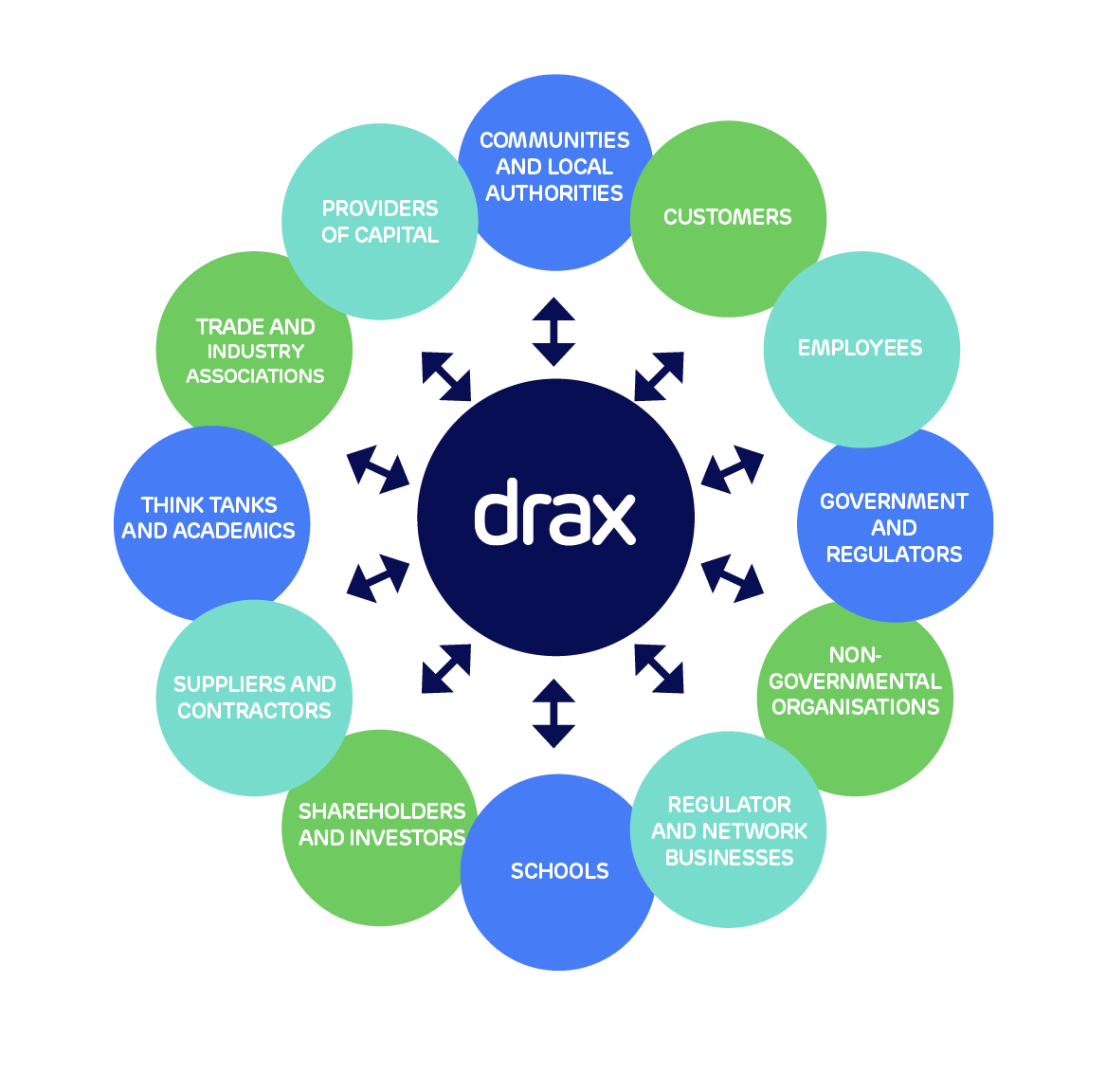
Progress in 2020:
- Participated in the UNGC Modern Slavery Working Group meetings
- Participated in the UNGC peer Modern Slavery Statement review
- Attended Slave Free Alliance Utilities Working Group meetings, to better understand their activities and how they might improve Drax’s modern slavery programme
- Engaged with Traffik Analysis Hub to better understand their offering and how it might compliment Drax’s risk assessment toolkit
In 2021, we plan to:
- Continue our work with the UN Global Compact
- Explore other potential partnerships and add associated services to our toolkit, as required
KPIs and looking ahead
“We’re committed to continual improvement and aim to strengthen our anti-modern slavery programme every year.”
Key Performance Indicators (KPIs)
We have internal KPIs that measure the effectiveness of our anti-modern slavery programme. We consult the EBCC on progress and performance
| KPI | Progress |
|---|---|
| Employee training levels | Building on our training programme from previous years, in 2020: |
| All colleagues and non-permanent workers received our new Drax Code, as a mandatory read, via our Learning Management System (c.3,100 people). New starters receive it during induction | |
| We developed a video detailing the tell-tale signs of modern slavery and embedded it within the Drax Code, for reference by all colleagues any time they need it | |
| Our Board and Executive Committee received Business Ethics eLearning (including specific content on modern slavery) | |
| We published several Group-wide articles on modern slavery over the course of the year | |
| Identify and use opportunities for collaboration to verify and resolve risk issues | Participation in the UN Global Compact (including membership of its Modern Slavery working group) continued throughout 2020. |
| We also engaged with Slave Free Alliance and Traffik Analysis Hub to explore potential collaboration opportunities. | |
| Take steps to upskill our high-risk suppliers | Our Biomass Sustainability Compliance team has continued its programme to promote modern slavery awareness when conducting biomass supplier meetings. |
| Strengthen our supply chain auditing and verification | The Biomass Sustainability Compliance team continues to engage with the Sustainable Biomass Programme (SBP). |
| Investigate reports of modern slavery and take remedial action, as needed | Not applicable, due to zero reports in 2020. |
| Maintain up to date due diligence information on supply chains that are high risk for modern slavery | We issue a modern slavery questionnaire where relevant and follow up where required. |
Planned initiatives consolidation for 2021
As described throughout this Statement, we’ll explore how to strengthen our activities to promote human rights and eradicate modern slavery during 2021. This will include:
| Programme element | Initiatives |
|---|---|
| Governance | Deliver more regular communications on the topic of modern slavery |
| Research suitable NGO/other partners to support Drax should we need to use the EBCC-approved remediation plan | |
| Risk assessment | Introduce our new Supplier Code into our onboarding and contracting processes |
| Reflect any updates to the Global Slavery Index in our due diligence platform, as required | |
| Continue our work to map the supply chain of our top categories of non-fuel spend | |
| Further strengthen our Country Risk Assessment processes by engaging a third-party expert | |
| Implement additional tools to strengthen our risk assessment process, as deemed necessary | |
| Due diligence | Further strengthen the human rights content of our supplier audits |
| Explore other tools/systems that could enhance Drax’s due diligence toolkit | |
| Implement the recommendations identified in the 2020 Due Diligence Review | |
| Seek to collaborate with some of our key freight partners on their due diligence programmes and modern slavery initiatives | |
| Policies and procedures | Continue with the implementation of our Supplier Code |
| Employment practices | Identify other suppliers to Drax that may pay below the real Living Wage and work with them to identify realistic milestones for its implementation |
| Collect diversity data as part of our 2021 survey and provide comparable statistics in our 2021 Statement | |
| Supplier contracts | Finalise the deployment of the Supplier Code |
| Consider adding more detailed non-fuel procurement content to the Ethics and Integrity section of our website | |
| Training | Adapt the eLearning issued to the Board and Executive Committee in 2020 and deploy to Drax’s wider leadership team |
| Develop refresher learning content on the Drax Code | |
| Feed the insight gathered from the employee survey into the development of future training materials | |
| Develop (internally) a detailed learning module on modern slavery and deploy to those teams deemed ‘at higher risk’ of encountering modern slavery, to replace the third-party material used previously | |
| Speak Up culture | Continue our awareness-raising campaign |
| Strengthen and standardise our investigation processes for speak up concerns | |
| Working together | Continue our work with the UN Global Compact |
| Explore other potential partnerships and add associated services to our toolkit as required once we’ve completed a full analysis |
Statement approval
We’re committed to doing the right thing. We believe this approach, and the measures we’re taking, demonstrate how effectively we’re identifying and addressing any modern slavery that could be connected to our business and supply chain.
The Drax board of directors has approved this statement for our financial year ending 31 December 2020. We’ve completed it according to the requirements of section 54, part 6 of the Modern Slavery Act 2015. It applies to all companies within the Drax Group that are required to have a Modern Slavery Statement, including:
- Drax Biomass Inc.
- Drax Corporate Limited
- Drax Generation Enterprise Limited
- Drax Group Holdings Limited
- Drax Group plc
- Drax Power Limited
- Drax Smart Generation Holdco Limited
- Drax Smart Sourcing Holdco Limited
- Drax Smart Supply Holdco Limited
- Haven Power Limited
- Opus Energy (Corporate) Limited
- Opus Energy Group Limited
- Opus Energy Limited
- Opus Energy Renewables Limited
- Opus Gas Supply Limited
This statement was signed by:
Dwight Daniel Willard Gardiner
(known as Will Gardiner)
Chief Executive Officer Drax Group plc
on 23 February 2021
Previous modern slavery statements
Downloadable versions of our previous statements.
Drax Group Modern Slavery Statement 2019
Drax Group Modern Slavery Statement 2018
Drax Group Modern Slavery Statement 2017
Drax Group Modern Slavery Statement 2016





